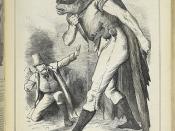The nature of humanity is shaped by a person's selflessness and willingness to give a persona something that they can't give themselves. This act of humanity can be seen through Romantic English author Mary Shelley's gothic novel "Frankenstein" (1913) and American director Ridley Scott's "Blade Runner" (1982). Although the two texts manifest from vastly different context they explore similar concerns of Human Nature, As Blade Runner could be seen as a didactic to Frankenstein. Both texts explore the quest of blind ambition leading to the loss of human nature, however through vastly different techniques due to their contexts. The blind ambition leading to the loss of human nature due to the consequences of the lack of responsibility taken by the creator for their creations life, As well as the destruction of the natural habitat and natural order. The questions of humanity and what it means to create human nature are still prominent concerns of societies today.
The gratitude of humanity in 'day to day' life is emphasized in the lack there of in both Shelley and Scott's Novel. This loss of humanity is enhanced through the relationship of both Frankenstein and his 'monster' and Tyrell and his replicant Roy. Shelley explores the lack of parental concerns through the relationship of Frankenstein and his monster. The monster experiences feelings of rejection from Frankenstein who denies him the support and guidance of a father. This taunted relationship forces an absence of humanity due to the irresponsibility of knowledge given to the monster. Shelley uses the metaphor of nature to emphasize the unwise actions of Victor towards his creation. This is first seen in the monsters birth, as Frankenstein is repulsed and frightened by the physical ugliness of his creation and escapes leaving his monster to enter the world without...


